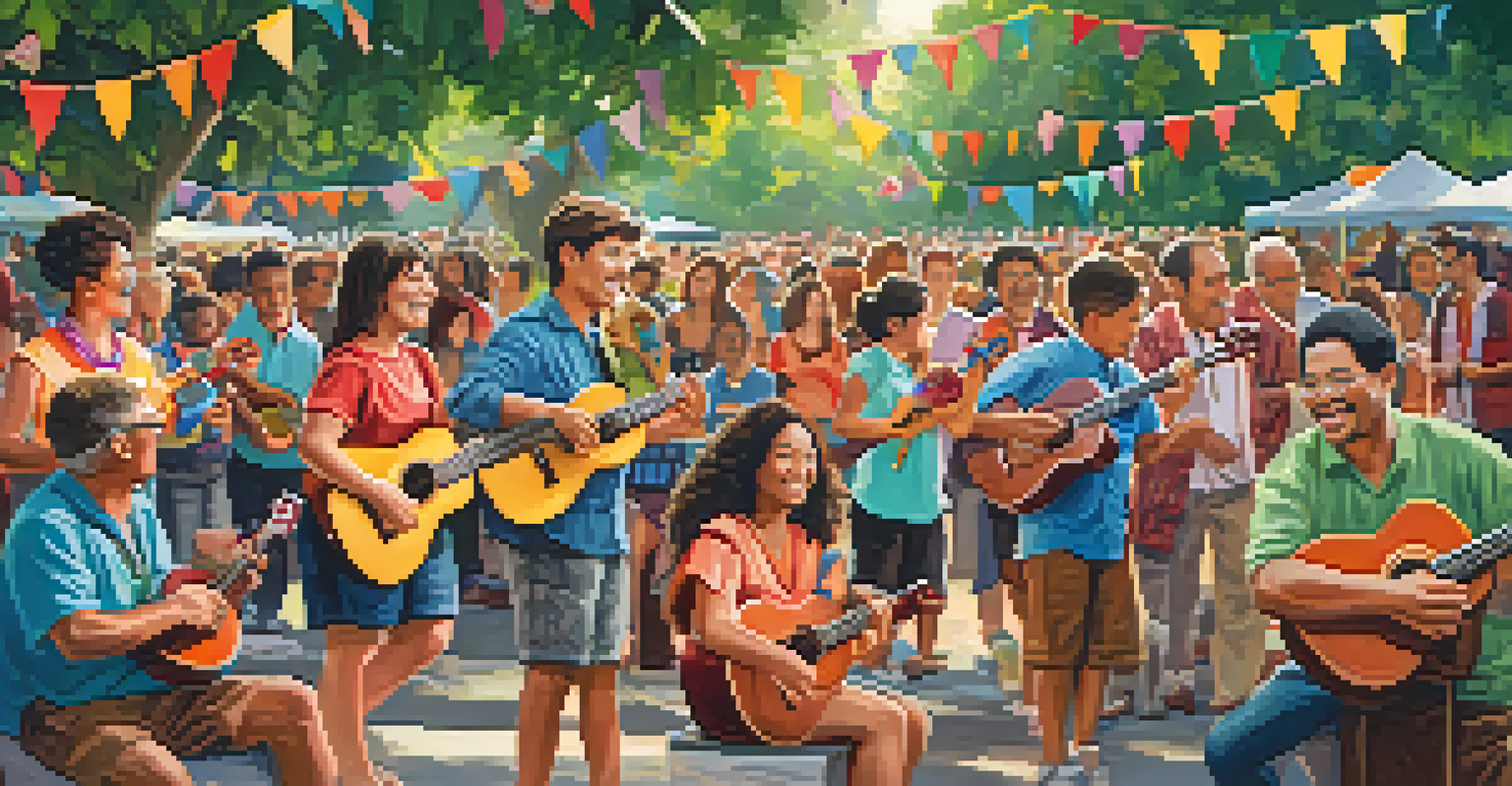Hawaiian Roots: The Ukulele's Journey to Popularity

The Ukulele's Origins in Hawaii: A Cultural Gem
The ukulele, often associated with the sunny shores of Hawaii, has deep cultural roots that trace back to the 19th century. It evolved from the Portuguese braguinha, brought by immigrants, showcasing a blend of different musical traditions. This small, four-stringed instrument quickly became a symbol of Hawaiian culture, embodying the islands' spirit and community.
The ukulele is a small instrument that has made a big impact on the world of music.
In Hawaiian language, 'ukulele' translates to 'jumping flea,' a name that reflects the lively strumming style. Its playful sound resonated with locals, making it a popular choice for gatherings and celebrations. As families strummed together under the palm trees, the ukulele became more than just an instrument—it turned into a means of connection and joy.
The instrument's popularity soared as it became intertwined with Hawaiian identity, leading to the creation of unique playing techniques and styles. It played a significant role in hula performances, enhancing the rhythm and storytelling elements of the dance. This cultural significance laid the foundation for the ukulele's journey beyond Hawaii.
The Ukulele's Introduction to the Mainland USA
The ukulele made its way to the mainland United States in the early 20th century, thanks in part to Hawaiian musicians performing in vaudeville shows. Audiences were captivated by its cheerful sound and charming appearance, leading to a surge of interest. By the 1910s, the ukulele began appearing in popular music, further solidifying its place in American culture.

One of the pivotal moments in the ukulele's rise was its feature in the musical 'The Black Crook' in 1866, which introduced it to a broader audience. This exposure led to a boom in ukulele sales, with many Americans eager to learn the instrument. Stores began stocking ukuleles, and instructional materials became widely available, fueling a new wave of players.
Cultural Roots in Hawaii
The ukulele, originating in 19th century Hawaii, symbolizes the islands' spirit and community through its lively sound and cultural significance.
As the instrument gained popularity, it became a staple in American households, often passed down through generations. Families began to embrace the ukulele for sing-alongs and gatherings, fostering a sense of community and creativity. This grassroots movement helped the ukulele secure its place in the heart of American music.
The Jazz Age: The Ukulele's Time to Shine
The 1920s brought about a musical revolution, with jazz taking center stage. The ukulele found its niche during this era, as jazz musicians incorporated it into their performances, showcasing its versatility. Artists like Cliff Edwards, known as 'Ukulele Ike,' captivated audiences with their ukulele-infused jazz tunes, making the instrument a prominent feature in the genre.
Music can change the world because it can change people.
The ukulele's upbeat sound complemented the lively rhythms of jazz, making it a perfect fit for dance bands. It became a popular choice for both solo performances and ensemble settings, allowing musicians to explore new creative avenues. This era marked a significant turning point for the ukulele, as it transitioned from a regional instrument to a national sensation.
With the rise of radio and recorded music, the ukulele reached even wider audiences. Record labels began to promote ukulele artists, leading to an explosion of sheet music and instructional books. The instrument's presence in jazz paved the way for its continued evolution and relevance in the music scene.
The Ukulele in Popular Music: A Resurgence
By the mid-20th century, the ukulele faced competition from other instruments and genres, but it experienced a remarkable resurgence in the 1990s. Artists like Israel Kamakawiwo'ole, with his haunting rendition of 'Somewhere Over the Rainbow,' brought the ukulele back into the spotlight. His heartfelt performances resonated with listeners, creating a renewed interest in the instrument.
This revival coincided with the rise of folk and acoustic music, where the ukulele's sweet sound blended seamlessly. Artists across genres began to experiment with the instrument, showcasing its versatility in everything from pop to rock. The ukulele became a symbol of simplicity and joy, appealing to a new generation of musicians and fans alike.
Resurgence in Popular Music
The ukulele experienced a revival in the 1990s, driven by artists like Israel Kamakawiwo'ole, blending its charm with modern musical styles.
As social media platforms emerged, the ukulele found a new home online. Viral videos and tutorials made learning the instrument accessible to anyone, further boosting its popularity. The ukulele community flourished, leading to festivals and gatherings celebrating this beloved instrument.
The Global Influence of the Ukulele
Today, the ukulele's influence extends far beyond its Hawaiian roots, resonating with musicians and enthusiasts worldwide. From Japan to Europe, the instrument has found a place in diverse musical cultures, adapting to different styles and genres. This global journey highlights the ukulele's ability to transcend borders and connect people through music.
Various international ukulele festivals celebrate this cultural exchange, bringing together players from all walks of life. These events showcase the instrument's versatility and encourage collaboration among musicians. The ukulele has become a universal symbol of creativity, friendship, and fun, fostering connections that span the globe.
Moreover, the ukulele's simple chord structures make it an ideal instrument for beginners, attracting new players of all ages. Its accessibility has sparked a worldwide movement, with countless tutorials and resources available online. As more people pick up the ukulele, its journey continues, enriching lives and creating a vibrant community.
The Ukulele's Impact on Education and Therapy
The ukulele's charm and simplicity have made it a popular choice in educational settings. Teachers around the world have embraced the instrument as a tool for music education, fostering creativity and collaboration among students. Its lightweight design and easy-to-learn chords make it an ideal starter instrument, helping children develop a love for music.
In addition to education, the ukulele is gaining recognition as a therapeutic tool. Music therapy programs have started incorporating the ukulele to aid in emotional healing and social interaction. Its soothing sound can promote relaxation and reduce anxiety, making it a valuable resource in mental health settings.
Global Influence and Accessibility
Today, the ukulele transcends borders, appealing to beginners worldwide and fostering a vibrant community through its simplicity and versatility.
As schools and therapy centers continue to adopt the ukulele, its positive impact on individuals and communities becomes increasingly evident. The instrument's ability to bring joy and foster connections is a testament to its enduring appeal. Through education and therapy, the ukulele is transforming lives and enriching experiences.
The Future of the Ukulele: A Continuing Legacy
As we look to the future, the ukulele's legacy is set to grow even stronger. With its rich history and global appeal, the instrument continues to inspire new generations of musicians. The blend of traditional and contemporary styles ensures that the ukulele remains relevant in an ever-evolving musical landscape.
Innovations in design and technology are also shaping the future of the ukulele. New materials and techniques are being explored, allowing for greater sound diversity and enhanced playability. This evolution opens up exciting possibilities for musicians to experiment and express themselves creatively.

Ultimately, the ukulele represents more than just an instrument; it embodies a spirit of joy, connection, and creativity. Its journey from Hawaiian roots to worldwide popularity is a testament to music's ability to unite us all. As the ukulele continues to evolve, it will undoubtedly create new stories and memories for future generations.